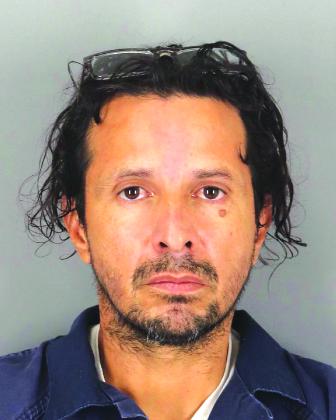In a blast from the past to the Jefferson County Criminal District Court of Judge John Stevens on Nov. 14, a man sentenced to serve probation in 1994 was brought before the court to finally answer for the crime he pleaded guilty to 28 years ago – attempted murder.
“The type looks funny from way back then,” Stevens said reviewing the charging instrument against Ricardo Bryan that contained typos from a time before spellcheck.
June 20, 1994 – 28 years ago – Bryan was placed on 10 years of unadjudicated probation for attempted murder. According to the evidence presented to the court, Bryan absconded from supervision, did not complete anger management counseling and did not submit to court-ordered electronic monitoring. Bryan admitted all were true.
“After only a couple months of probation, he disappeared,” Jefferson County prosecutor Jimmy Hamm advised the court. Bryan wasn’t seen again until “he attempted to come into the country” in October. “I demanded he be brought here to answer why he has been gone for 28 years.”
Bryan’s defense attorney, John West, admitted his client did abscond from justice – and the country – just three months after being ordered to community supervision.
“There’s an interesting story there,” West said, asking for the court to hear the defendant. “We’re just wanting to let the court know what happened.”
From a jail cell via a Zoom link to the court, Bryan explained he fled to his parents’ home country of Nicaragua to be at his grandmother’s deathbed, then embarked on a life of love and happiness.
“I met my current wife. I was 19 years of age at the time,” he said. First came love; then came a baby, now 25 years old.
“I didn’t know what to do,” he said. “I didn’t want to abandon my kid. I wanted to be with her.”
Three more kids came later. Bryan said he supported his family from careers held at Capital One, Sprint and as a freelance English teacher.
“I wanted to be there for my family and be a good role model for them,” he said. “I didn’t want to leave my family.”
Bryan said he returned to America nearly 30 years later to face the felony punishment he was handed down as a teen. Having found Christ along the way, Bryan said he felt it was his moral obligation to answer for his past bad acts.
“I had a job; I had everything going for me there (in Nicaragua),” Bryan said, adding that he would rather lose his freedom than his immortal soul. “I had it pretty good.”
Prosecutor Hamm said Bryan at age 16 was hardly the man who sat before the court this week. At the time of his unagreed sentencing, Bryan was running around with gangs, and was convicted of attempting to kill a person from a rival gang, he said. “The violent nature of that crime is the stepping stone of dealing with violence the level it is in this county.”
Bryan, the court noted, was sanctioned for nine separate offenses by the time he fled probation orders at age 16.
“It got worse and worse,” Stevens shared, the attempted murder not the first violent offense of which the teen was accused in the 1990s. “(Bryan) was sanctioned each time; he just continued to make a bad choice.”
Stevens returned his attention to the victim of the crime for which Bryan was sentenced in 1994. At the time of the assault, the victim was not expected to live.
“He was permanently disabled because of his injuries,” the judge read of the victim’s experience from Bryan’s case file. “They hit him with pipes, bats and other weapons. The defendant here admitted to kicking the victim in the face. He lived – but it wasn’t because of the defendant’s conduct. He was left to die for other people to save.”
Hamm also presented a different scenario of Bryan’s return to the states. According to the prosecutor, Bryan was arrested at the border on Hamm’s request when the fugitive attempted to make entry with his family.
“They asked if we wanted him,” Hamm said. The response was an immediate affirmative.
According to Hamm, running from justice for decades does not negate Bryan’s requirement to serve the time for the crime he committed. At sentencing, Bryan faced between 2 and 20 years for the attempted murder charge he pleaded guilty to, and accepted probation for, in 1994.
“I’m still asking for 20 years,” Hamm told the court.
Bryan pleaded for the court’s mercy, invoking ill parents, as well as a daughter who is a senior at Memorial High School in Port Arthur.
“I want to show I’m a different man,” he said.
Stevens did not impose maximum sentencing, but did not reinstitute probation as Bryan had hoped. Unadjudicated probation was turned into prison confinement for 10 years.
“You’ve come to face justice, sir,” Stevens said. “It’s about time.”
West said Bryan’s case was the most unique he’s ever defended.
“He’s lived a good life for the last three decades,” West argued, to the judge’s retort: “So he says.”
“He’s found his faith,” West said of his client. “He could’ve stayed in Nicaragua for the rest of his life and never faced this. They would have never done anything to him.”
Stevens seemed open to revisit the matter, agreeing to speak with the defense and prosecution after the hearing.
“Twenty-eight years later, I’m glad he’s doing the right thing,” Stevens said. However, “America has been here for 28 years while he’s been an absconder and hiding out.”



